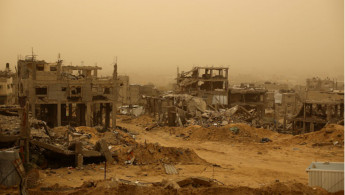Israel accused of 'indiscriminate' attacks in Gaza war
Israel failed to discriminate between military and civilian targets as it killed more than 2,000 Palestinians during last year's war in Gaza, a human rights group has said.
The report, commissioned by the Physicians for Human Rights group, contradicts claims by Israel that it gave sufficient warning for civilians to leave residential areas before they were attacked, leading to avoidable deaths.
The report said: "Attacks were characterised by heavy and unpredictable bombardments of civilian neighbourhoods in a manner that failed to discriminate between legitimate targets and protected populations.
"In numerous cases, double or multiple consecutive strikes on a single location led to multiple civilian casualties and to injuries and deaths among rescuers."
The report said the deaths of medics and hospital staff wee violaions of humanitarian law.
More than 100,000 Palestinians remain homeless, months after the conflict ended.
The 237-page report, written by eight independent medical experts, was based on visits during and after the war, interviews with 68 people wounded during the fighting, post-mortem examinations on 370 victims and the review of dozens of medical files.
| Attacks were characterised by heavy and unpredictable bombardments of civilian neighbourhoods. |
Israel has insisted it minimised civilian deaths and sent warnings to residents of houses due to be targeted. These came in the form of phone calls, text messages and "roof knocking" targeted buildings with non-explosive missiles.
The report concluded that these warnings were inconsistent and did not provide ample time for evacuation.
Only seven percent of those interviewed reported receiving early warnings.
The report added that in Khuzaa, in southern Gaza, the "reported conduct of specific troops in the area is indicative of additional serious violations of international human rights and humanitarian law."
It recommended a "legal determination of violations of international human rights and humanitarian law, whether through local or international justice mechanisms."
Palestinian NGO Al-Mezan has said the ineffective use of preliminary warning strikes could constitute a war crime. Palestinian officials plan to sue Israeli officials for war crimes through the International Criminal Court.
Israel questioned the report's credibility, saying it was "one-sided" and "biased".





 Follow the Middle East's top stories in English at The New Arab on Google News
Follow the Middle East's top stories in English at The New Arab on Google News
![Netanyahu furiously denounced the ICC [Getty]](/sites/default/files/styles/image_330x185/public/2024-11/GettyImages-2169352575.jpg?h=199d8c1f&itok=-vRiruf5)
![Both Hamas and the Palestinian Authority welcomed the ICC arrest warrants [Getty]](/sites/default/files/styles/image_330x185/public/2024-11/GettyImages-2178351173.jpg?h=199d8c1f&itok=TV858iVg)
